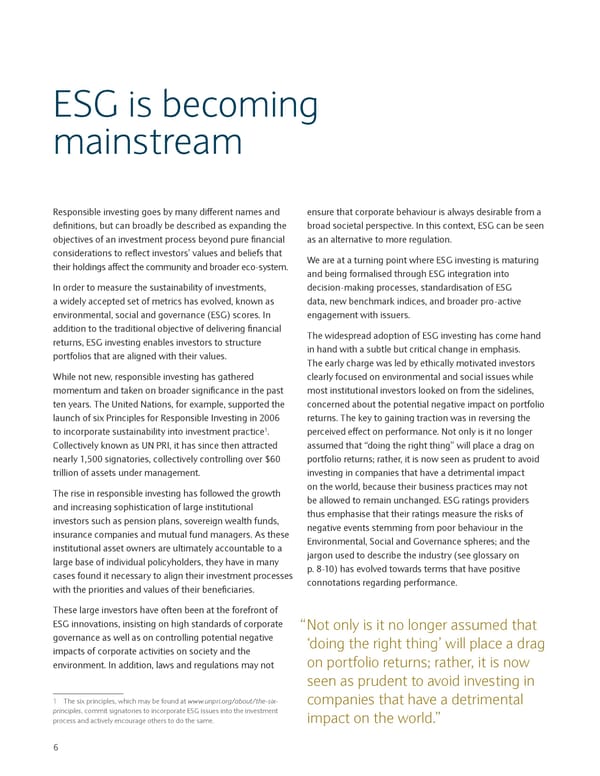ESG is becoming mainstream Responsible investing goes by many different names and ensure that corporate behaviour is always desirable from a definitions, but can broadly be described as expanding the broad societal perspective. In this context, ESG can be seen objectives of an investment process beyond pure financial as an alternative to more regulation. considerations to reflect investors’ values and beliefs that We are at a turning point where ESG investing is maturing their holdings affect the community and broader eco-system. and being formalised through ESG integration into In order to measure the sustainability of investments, decision-making processes, standardisation of ESG a widely accepted set of metrics has evolved, known as data, new benchmark indices, and broader pro-active environmental, social and governance (ESG) scores. In engagement with issuers. addition to the traditional objective of delivering financial The widespread adoption of ESG investing has come hand returns, ESG investing enables investors to structure in hand with a subtle but critical change in emphasis. portfolios that are aligned with their values. The early charge was led by ethically motivated investors While not new, responsible investing has gathered clearly focused on environmental and social issues while momentum and taken on broader significance in the past most institutional investors looked on from the sidelines, ten years. The United Nations, for example, supported the concerned about the potential negative impact on portfolio launch of six Principles for Responsible Investing in 2006 returns. The key to gaining traction was in reversing the 1 to incorporate sustainability into investment practice . perceived effect on performance. Not only is it no longer Collectively known as UN PRI, it has since then attracted assumed that “doing the right thing” will place a drag on nearly 1,500 signatories, collectively controlling over $60 portfolio returns; rather, it is now seen as prudent to avoid trillion of assets under management. investing in companies that have a detrimental impact The rise in responsible investing has followed the growth on the world, because their business practices may not and increasing sophistication of large institutional be allowed to remain unchanged. ESG ratings providers investors such as pension plans, sovereign wealth funds, thus emphasise that their ratings measure the risks of insurance companies and mutual fund managers. As these negative events stemming from poor behaviour in the institutional asset owners are ultimately accountable to a Environmental, Social and Governance spheres; and the large base of individual policyholders, they have in many jargon used to describe the industry (see glossary on cases found it necessary to align their investment processes p. 8-10) has evolved towards terms that have positive with the priorities and values of their beneficiaries. connotations regarding performance. These large investors have often been at the forefront of ESG innovations, insisting on high standards of corporate “ Not only is it no longer assumed that governance as well as on controlling potential negative ‘doing the right thing’ will place a drag impacts of corporate activities on society and the on portfolio returns; rather, it is now environment. In addition, laws and regulations may not seen as prudent to avoid investing in 1 The six principles, which may be found at www.unpri.org/about/the-six- companies that have a detrimental principles, commit signatories to incorporate ESG issues into the investment impact on the world.” process and actively encourage others to do the same. 6
 Sustainable Investing and Bond Returns Page 6 Page 8
Sustainable Investing and Bond Returns Page 6 Page 8